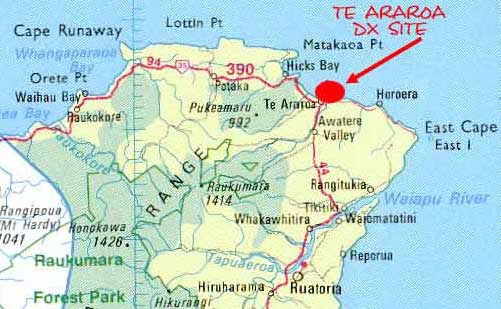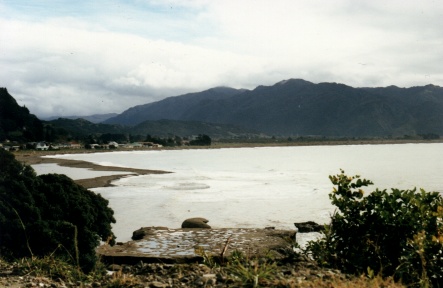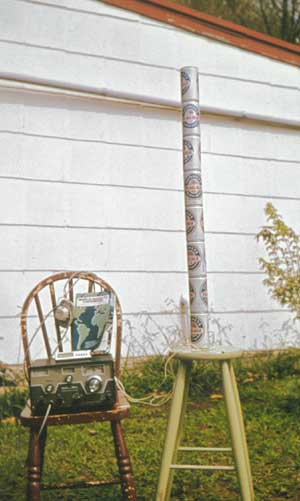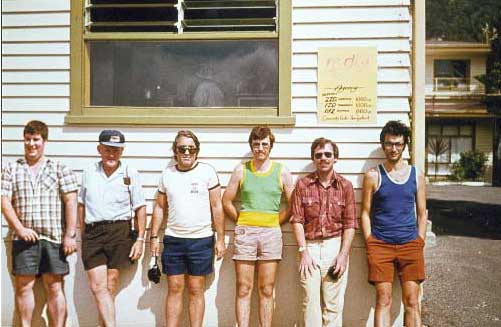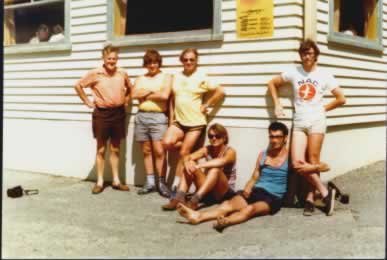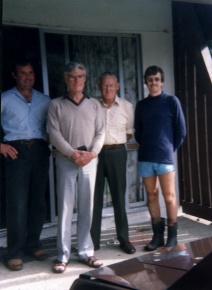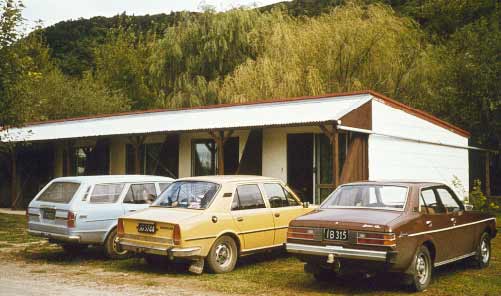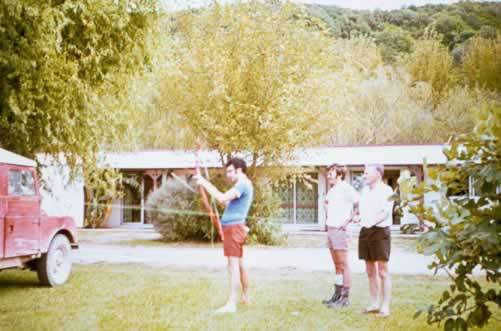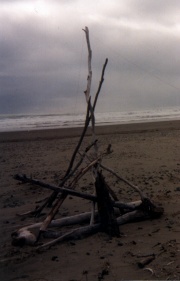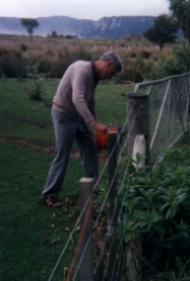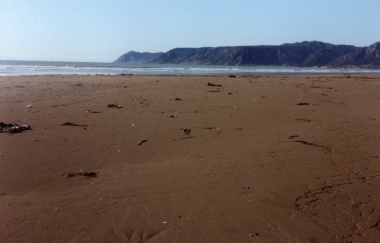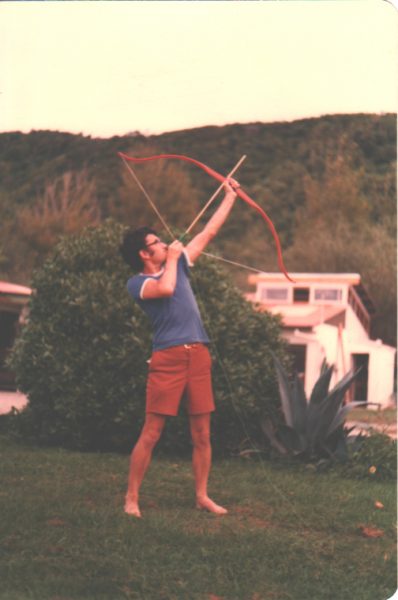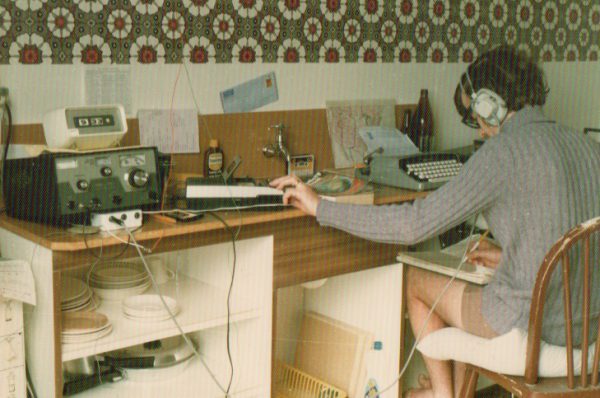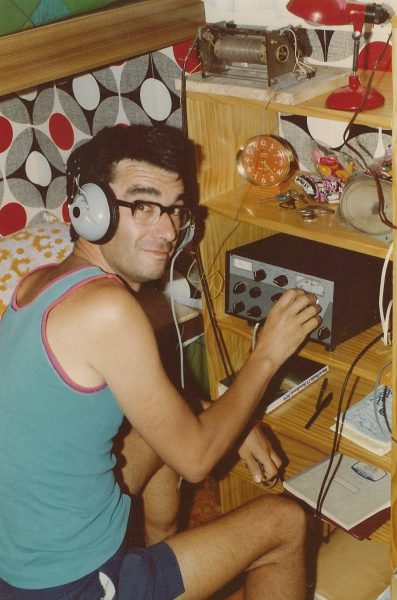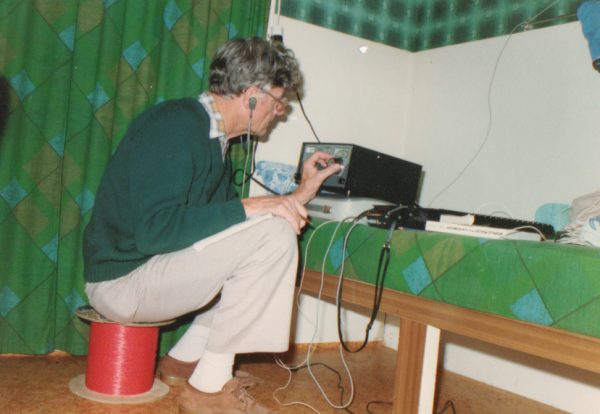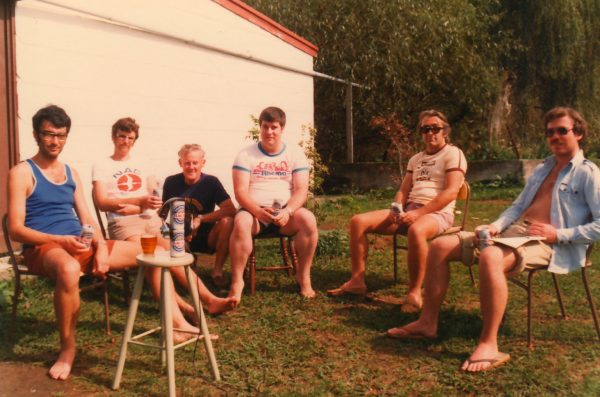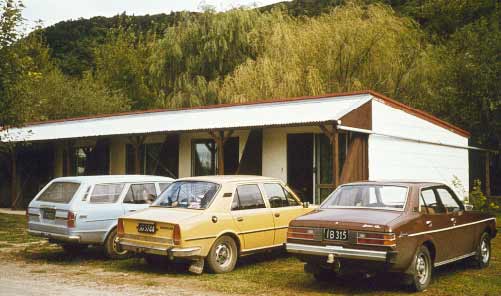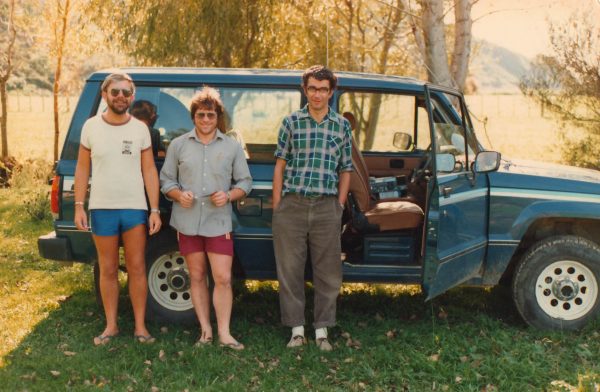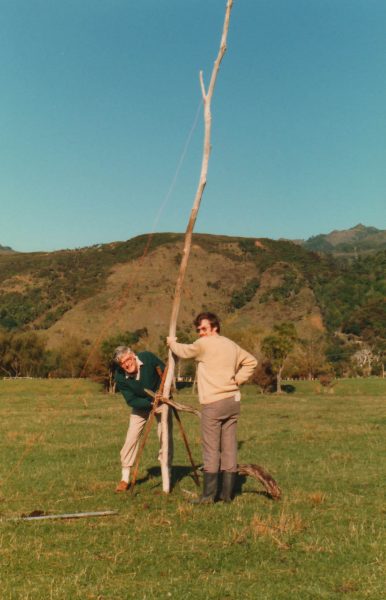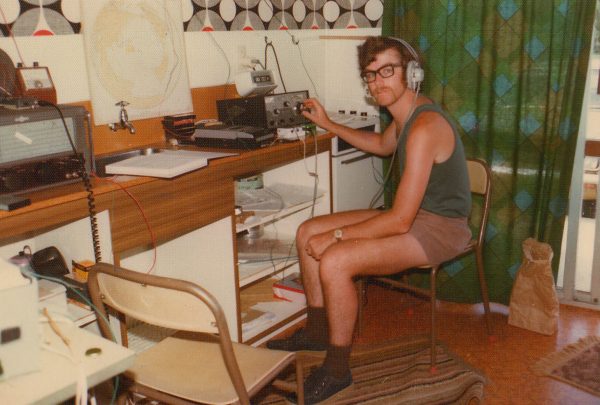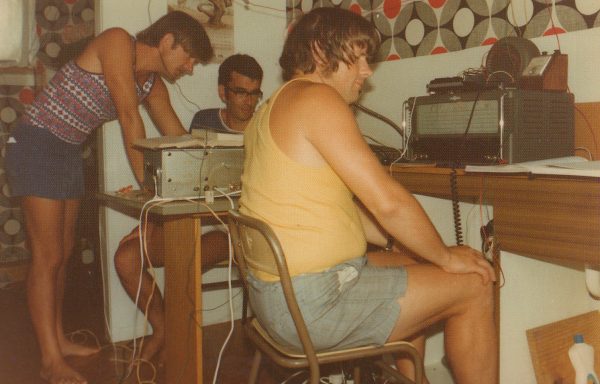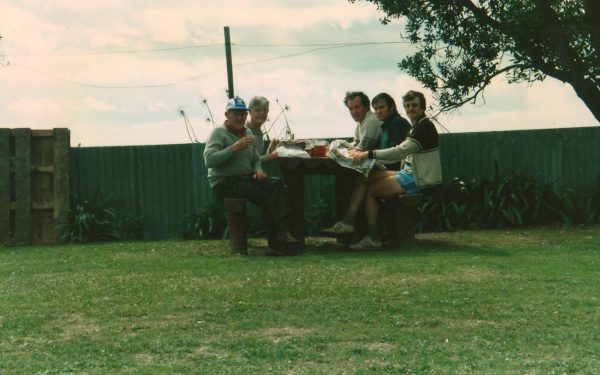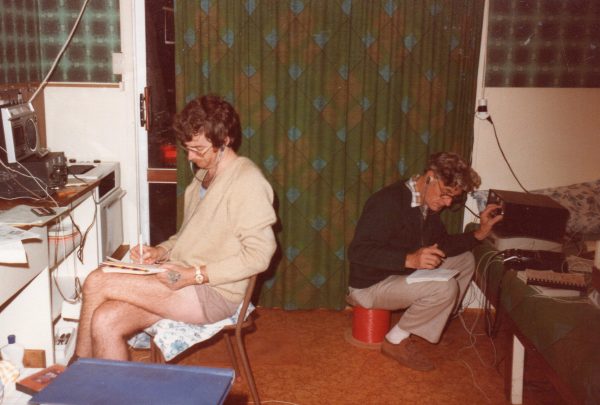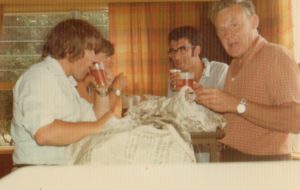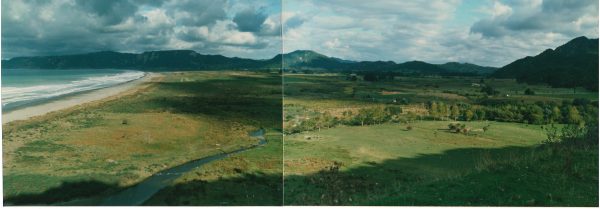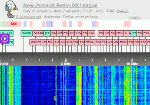Well, you can get a bit further East in NZ… but not much! (Image: Mark Nicholls)
Te Araroa is one of the first places in NZ to see the light of the new day, on the most North-Easterly past of the country above Gisborne and East Cape. DXers stay at the motor-camp and run aerials out towards the Americas. Some phenomenal reception of long-path European and North Africans has been reported along with excellent signals from North America and the Pacific, with Fijians audible even at midday.
Te Araroa Township to the left… the motor camp is out of view to the right at the Northern end of the bay. The range of hills in the background circles the motor camp and is credited with blocking New Zealand signals significantly.

Mike Smith (the New Plymouth one) with a Hallicrafters “borrowed” from a marine station that Mike was involved with at the time
Mark Nicholls and I spent a week at the motor camp in April 1988. A week after Cyclone Bola devastated the region. We stayed in the cabins and ran wires from North East around to due East. Because a lot of the locals had been flooded out of their homes the motor camp was heavily occupied and the TV lounge was directly under one of the wires. We had to contend with poor reception on the first night and some local QRN though the camp manager kindly turned off his electric fence unit for us.
Te Araroa Beverage. (Photo credit: Mark Nicholls)
Best reception came from US stations signing-on around their dawn period. Also some good signals from Europe via the long-path… most notably Spain, as well as Algeria 1422 and Canary Islands 621 though I missed logging the latter choosing to get a bit more detail on Sevilla 684… when I went back to 621 all I could hear was Tuvalu which had faded up!
Back at the pub: Mark Nicholls, Jack Searle, Jim Gorman, Bryan Clark, David Ricquish & Barry Williams. (Photo credit: Mark Nicholls)
The manager had kindly left a number of thick bamboo poles from a previous DXpedition undisturbed (supplied by Robin Chambers?) so these were put to good use.
I would recommend use of the tourist flats (self-contained semi-motel units) for any further DXpeditions as they are further to the East and would avoid the TV lounge completely as well as being a little more comfortable than the cabins. The only negative is that it would make the aerials around 50 metres shorter though lowering the TVI would more than make up for that!
Te Araroa DXpeditioners: Left to right: Jack Searle, Dene Lynneburg, Ray Babbage, Tony Marr, Barry Williams and Bryan Clark. Written on the back is “The building is the Te Araroa Hotel, our regular lunch stop, on a DXpedition to East Cape”. One of the keener members used to run the distance from the camp into town for lunch at the pub. I think he’s the one without the shoes… (Photo credit: Jack Searle)
Robin Chambers, Harry Weatherley, Jack Searle and Bryan Clark on DXpedition in 1987. Bill Woller comments “On the 1987 trip, Robin got a fix on where we would set up our main European antenna. The compass pointed right up the middle of the big swamp out to the East. I said to Rob “I think we might have to deviate a bit here”. But no way, the master of dragging out long wires plunged in, through cutty grass and other assorted roughage which was around 3 metres tall, but he did take off his footwear before he disappeared for about an hour. A1l I had to do was feed the wire in from the safety of dry ground. Talk about keen, I reckon Steve Irwin would have thought twice before going in there. Well the results speak volumes. A DXpedition with out Rob would certainly miss out.” And I can vouch for the swamp story… I also though an aerial needed to go in the same direction and waded through mud, over and uder the undergrowth… and was rewarded with some nice Latins to boot… (Photo credit: Bill Woller)
Home to itinerant DXers. (Photo credit: Mark Nicholls)
Barry “Robin Hood” Williams instructing Bryan Clark and Jack Searle in how to get wires over trees. (Photo credit: Mark Nicholls)
The beach end of a Beverage… using local materials… (Photo credit: Bill Woller)
Harry Weatherley using electric fence wire for an aerial. (Photo credit: Bill Woller)
From the beach at Te Araroa, looking South back towards the township. (Photo credit: Bill Woller)
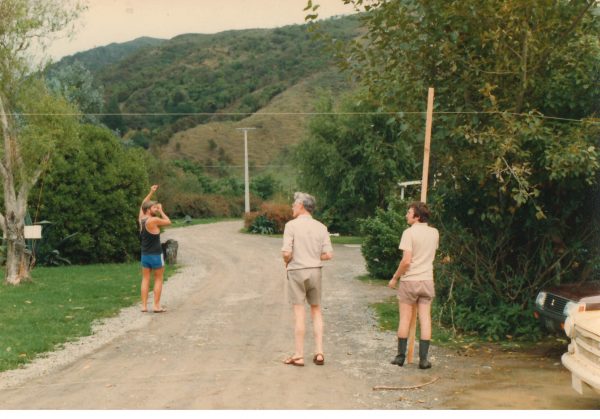
Tony Marr, Harry Weatherley and Bryan Clark making sure the wires are up high enough not to strangle someone.
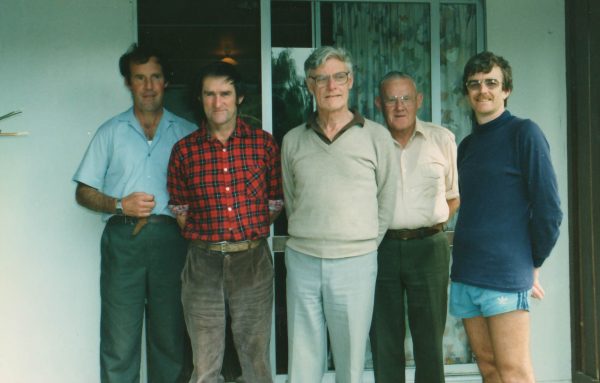
Robin Chambers, Bill Woller, Harry Weatherley, Jack Searle & Bryan Clark
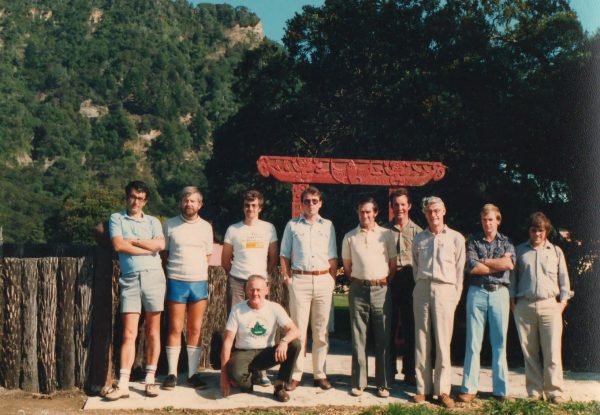
Barry Williams, Tony Marr, Bryan Clark, David Ricquish, Bill Woller, Robin Chambers, Harry Weatherley, Mike Smith, Dene Lynneberg, and Jack Searle in front.

